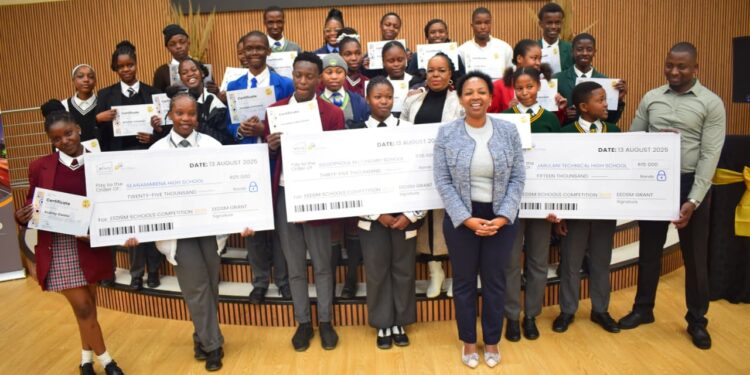City Power marked two major milestones in its drive towards a sustainable energy future by celebrating the winners of the 2025 Schools’ Energy Efficiency and Demand Side Management (EEDSM) competition and launching the Energy Performance Certificate (EPC) for the City of Johannesburg municipal buildings.
The event, hosted on Wednesday, 13 August 2025 at City Power’s headquarters, was officiated by City Power CEO, Tshifularo Mashava. It brought together learners, educators, municipal officials, and energy officials from the City of Johannesburg to celebrate education-driven climate action.
The EEDSM Schools’ competition is a national initiative implemented by City Power in collaboration with the Department of Electricity and Energy (DEE), and funded through the EEDSM grant programme. It is designed to promote a just and sustainable energy transition by fostering awareness, innovation, and environmental stewardship among high school learners. City Power CEO, Tshifularo Mashava, praised the young participants, emphasising that the event represents a commitment to provide the resources, mentorship, and platforms needed for their innovations to thrive, alongside the City of Johannesburg supporting them every step of the way.
“City Power is about keeping the lights on for our people, and also for the progress of society. The progress of society is guaranteed with the brilliant minds in this room. We’ve seen that the future is truly in the hands of our youth. The submissions that we received completely blew us away and exceeded our expectations. Our responsibility is to nurture and support young minds, ensuring that the inspiration they have shown here doesn’t end today,” said Mashava.
“We also congratulate and celebrate young girls entering the energy space. All it takes is the mindset to say, ‘I can be wherever I want to be,’ especially as we observe Women’s Month. Today it is not just about the event or the competition; it’s about our ongoing commitment to supporting these young minds. We will be calling on businesses to support future initiatives like this one. These learners are not just future leaders; they are already innovators shaping how our city uses and saves energy. Their work proves that climate action starts in our classrooms and can inspire change in our communities, added Mashava.
This year’s competition engaged 19 schools across all regions of Johannesburg. The learners competed in three practical and creative categories, including poster design to showcase renewable energy and energy-saving ideas, short videos promoting efficiency at home and school, and prototype models demonstrating innovative, often recycled, energy-saving solutions.
Sgodiphola Secondary School clinched first place, winning R35,000 for their cost-effective solar water heating model, followed by Seanamarena High School’s impactful household energy conservation video in second place, which earned them R25,000, and Jabulani Technical High School’s automated classroom lighting system in third place, winning R15,000. The EEDSM Schools’ competition will be expanded to integrate with key platforms such as the 2025 Energy Indaba, youth internship programmes, and ensure that winning ideas are shared widely and young innovators are supported in their career pathways.
While accepting his award, Lesedi Mokone from Jabulani Technical High School said he was honoured to be part of the competition, as he has always been curious about fixing things around the house and pursuing innovation.
“Thank you to City Power for this opportunity. It is my dream to become an electrical engineer, a passion I’ve had from a young age. I was always curious and wanted to fix things around the house. During the load shedding periods, I would think that if I were an electrical engineer, and companies listened to us as people, we could find solutions to these problems,” said Mokone.
During the ceremony, City Power unveiled its newly issued EPC and 28 additional EPCs for municipal buildings, which are now certified under the national Regulations for the Mandatory Display and Submission of EPC for Buildings.
“The Environment and Infrastructure Services Department (EISD), in partnership with City Power, has been leading efforts to ensure the City of Johannesburg complies with the Regulations for the Mandatory Display and Submission of Energy Performance Certificates for buildings. These national regulations require qualifying nonresidential buildings to display an EPC, which rates a building’s energy efficiency based on 12 months of actual consumption. EPCs serve as a tool for transparency, accountability, and long-term energy savings,” said Olga Chauke, EISD Head Energy at the City of Johannesburg.
“Achieving EPC compliance is about more than meeting regulations. It is a statement that Johannesburg is serious about transparency, energy efficiency, and climate resilience. Our leadership in this space sets the tone for other municipalities and the private sector,” added Chauke.
Promulgated under the National Energy Act in 2020, the regulations require qualifying government and non-residential buildings to display an EPC showing their energy performance based on actual consumption over 12 months. The certificates must be issued by a SANAS-accredited inspection body and recorded in the National Building Energy Performance Register, managed by SANEDI. The City of Johannesburg has made significant progress with 57 buildings identified for EPC certification, 54 registered with SANEDI, and 29 buildings officially issued with EPCs to date.
These include facilities such as the Joburg Theatre, Joburg Market, Johannesburg Roads Agency, Johannesburg City Parks and Zoo, and the Department of Community Development, to name a few.
The dual celebration reflects the City Power’s integrated approach to the energy transition, combining youth education, community engagement, infrastructure efficiency, and regulatory compliance. Through the EEDSM Schools’ competition, City Power is building a pipeline of informed, skilled future leaders who can contribute to national energy policy, technology, and sustainability efforts. Simultaneously, through the EPC programme, the city is reducing municipal energy consumption, improving operational efficiency, and aligning with its Climate Action Plan (CAP) goal of achieving net-zero emissions by 2050. Meanwhile, the EPC compliance programme will continue, with remaining municipal buildings targeted for certification before the extended national deadline of 7 December 2025.









